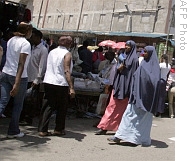VOA标准英语2008年-Somali Refugees Head to Nairobi's 'Little Mogad
搜索关注在线英语听力室公众号:tingroom,领取免费英语资料大礼包。
(单词翻译)
By Derek Kilner
Nairobi
20 June 2008
 |
| Somali refugee women walk by business structures in Nairobi neighborhood of Eastleigh, an area which is frequented by Somalis, 26 Nov 2007 |
Since Somalia's government collapsed3 in 1991, tens of thousands, perhaps hundreds of thousands of Somalis have made their way to the Kenyan capital. Most of them head to the neighborhood of Eastleigh, on the outskirts4 of downtown Nairobi, transforming what was once an enclave for Kenya's Indian population into what has come to be known as "Little Mogadishu."
The air is filled with the sounds of the Somali language and the smell of Somali food and spices. Somali men gather to talk outside small mosques5 and women pass by in hijabs. But what strikes the visitor most is the bustle6 of one of Nairobi's most thriving commercial centers.
Aided by an extensive smuggling7 network, the neighborhood is a major regional hub for low-priced goods. The narrow streets are lined with shops, stalls, and makeshift stands offering everything from textiles and used clothing to the mild leafy stimulant8 known as kaat.
Kenya has a sizable ethnic9 Somali population, and many of the shop-owners are Kenyans. But much of the economy is driven by Somalis working informally, lacking Kenyan immigration papers and, having chosen to avoid the refugee camps, lacking documented refugee status and assistance from the United Nations.
Mohamed Ahmed Yahye works in a street-front shop selling shampoo, perfume and other products. He says he works all day and doesn't have the time to apply for refugee status. He says he makes enough to pay his rent and put food on the table, but nothing extra.
Mulki Abdullahi, who sells textiles from a sidewalk stand, fled from Somalia as a young girl in the early years of the civil war. Now in her early 20s she has spent nearly her whole life in Eastleigh, but her status is just as precarious10.
Many of the young Somalis in Eastleigh cannot even find informal work. Adam Yusuf Jimale came to Nairobi in 2003, after spending two years at the Kakuma refugee camp near the Sudan-Kenya border.
"There is no place to work, because I am refugee," he said. "I live with my friends. I don't like to stay in this country, because many times I look for the job, everything depends on the ID."
Yusuf Issak, who was a high school principal in Mogadishu, has been in Nairobi for six months.
"Registration11 is not something easy, it's too difficult," he explained. "Until now we are searching to get registration. I have tried many times.
The steady stream of new arrivals from Somalia has driven up housing costs. Abdi Nasr Kujufay, who was a teacher in Mogadishu, fled to Kenya in October last year.
"The rent is very expensive," he noted12. "Other expenses are very expensive. It's very hard."
Many Kenyans have been priced out of the neighborhood, with Somalis sharing apartments, sometimes as many as nine or 10 to a room. Those without work often stay with relatives or friends who have jobs, or who receive money from family abroad. Issak, the former principal, receives money from relatives in Australia and Britain.
The exploding population and commerce has overwhelmed the neighborhood's aging infrastructure13. Unpaved roads become sticky with mud when it rains or dusty when the weather is dry. The narrow streets are perpetually jammed with traffic and trash piles up on the side of the road. With the Kenyan government largely turning a blind eye to the refugee population, the neighborhood receives little in the way of public services.
With few police around, crime is also a problem. Muggings and carjacking are common, and the neighborhood, many say, is the place to go to purchase automatic weapons.
When police do come to Eastleigh, it is often to crack down on undocumented aliens. The Somali population has been a source of terrorism concerns, and sweeps have often followed terrorist attacks like the 2005 London bombings, when East African Muslims were suspected of involvement.
Despite the struggles of daily life, Issak says things are much better than in the country he left.
"The difficulty is about the document only," he said. "There is fighting in Mogadishu, but I prefer to stay here. One day I will get that document as I hope, after that I will leave to Australia."
Like most refugees in Eastleigh, Issak would like to return to Somalia when fighting ends. But with international peace efforts showing few signs of slowing the conflict, it may be a long time yet before he sees his home.




